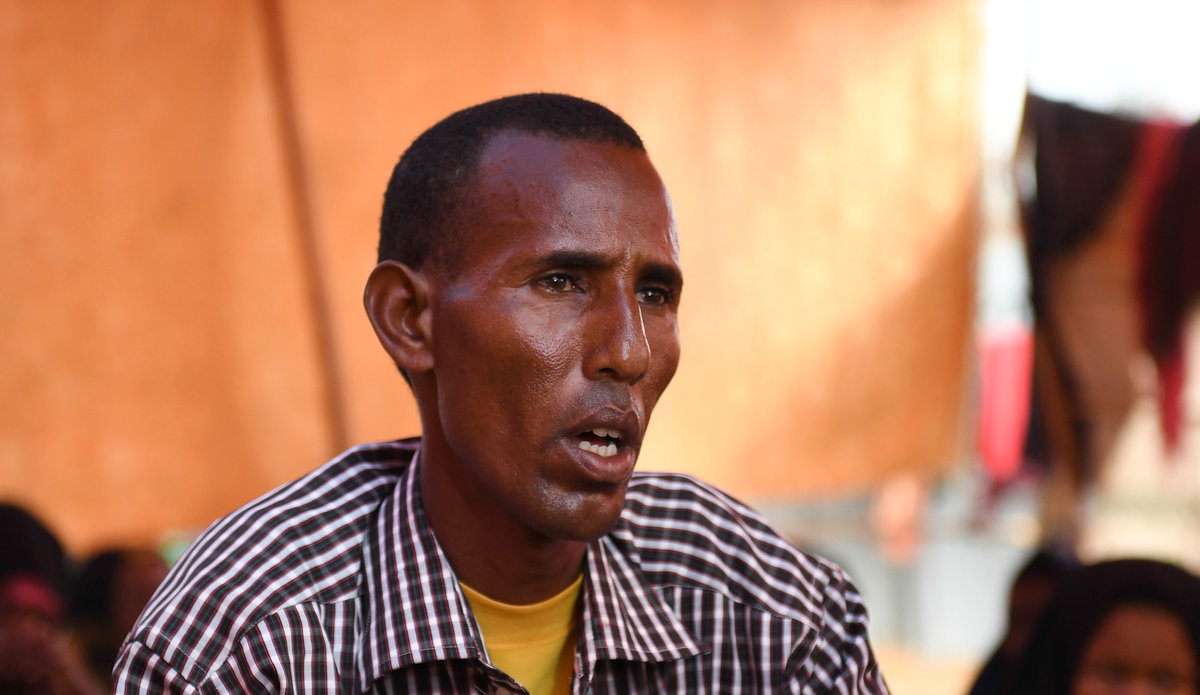Hassan Aden desperate to stay alive as drought continues to bite
Hassan Buule Aden, is 40 years old and one of the new arrivals at Al-Adala camp for internally displaced persons seeking a quick response from government and the international community to help mitigate the devastating drought.
Aden fled Dacaraale in the outskirts of Qoryooleey town, in Lower Shabelle region, to the temporary camp located at Mogadishu’s Kilometre 13 on March 15, leaving behind his two wives and nine children, at a place he refers to as safe, to set up at the camp ahead of their arrival.
“Sahra (the camp manager) took us from the roadside when we arrived. She brought us to this hall we are sitting now and provided us with food. We were starving when we arrived here,” he tells. Aden and other IDPs trekked for 12 days before reaching Mogadishu.
Though the situation is better in the camp than in Dacaraale, Hassan says the response from the Somali government and the international community needs to be scaled up to save families left behind, not only in South West state but also in other parts of Somalia.
Currently, they are surviving on donations from good Samaritans which are not enough to feed the 1000-plus IDPs in the camp.
“When I arrived here I was so weak that I could not take a step. Now I am in the midst of people, I was given some clothes. I am provided with breakfast, lunch and dinner. Thanks to God I expect some more relief,” he says as a man passes by distributing dry pieces of bread in a wheelbarrow.
Aden is among the 295 families that arrived at the camp recently joining the 1,114 families that were already living in the camp and the burden of feeding the burgeoning population continues to become harder by the day for the camp managers.
Due to hunger, Aden says, some of his family members would have found it difficult to accompany him to Mogadishu, He says both his eldest son, who is 22 years old, and the youngest, who turned one year recently, are all in dire need of humanitarian aid.
Dacaraale town’s 1500 households are one of the worst affected by the ongoing drought and fears are that the worst is yet to come.
“There was lack of water in Dacaraale town, the drought has affected and destroyed crops and livestock. Some people have fled but others are still trapped there. They are suffering and I would urge a quick humanitarian intervention to address their plight,” Aden says.
Before the drought, he was capable of feeding his large family as his crops and livestock were all doing well but not anymore.
“We had cattle, goats and fertile farmland. We did not receive sufficient rains in the last three years. Our livestock died and crops dried up. We fled from hunger and thirst,” he recounts.
To stress the gravity of the crisis, Aden says six people, who were part of the recent group fleeing Dacaraale town, died on the way due to hunger and fatigue. It is not the first time Aden is fleeing town in times of crisis. During the 2011 drought crisis, he fled to Mogadishu but went back to rebuild his livelihood when the situation improved.
The widespread water and pasture shortages have forced people to migrate in search of food and water for domestic and livestock use. Between November 2016 and the end of March 2017, over 400,000 people were internally displaced due to the drought, according to the Office of the United Nations High Commissioner for Refugees. Most of the newly displaced are moving into urban areas and joining existing settlements or establishing new settlements, while others are crossing into neighboring countries.
 UN
UN





